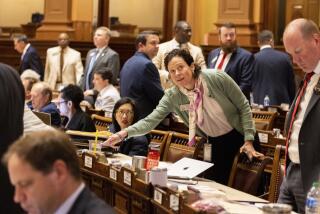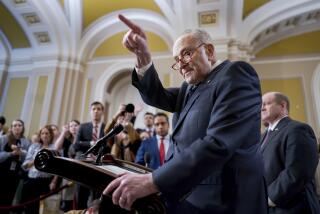U.S. Election Reform Closer to Reality With Senate Deal
- Share via
WASHINGTON — The movement to overhaul federal elections after last year’s debacle in Florida took another major step Thursday as key senators reached a compromise on legislation that seeks to make voting easier but cheating harder.
The announcement by prominent Republicans and Democrats broke a months-long standoff and virtually assures Senate passage of an election reform bill next year.
Coming a day after the House resoundingly approved its own election bill--winning plaudits from President Bush--the Senate agreement raises the likelihood that reforms will be enacted in time to affect the next presidential election.
Seeking to redress myriad complaints that surfaced in the aftermath of the 2000 election, the Senate bill would make federal grants available to help states meet new requirements to upgrade voting systems, allow greater access to the polls and develop statewide voter registration systems with anti-fraud safeguards.
In a notable departure from the House bill, the Senate compromise would not provide specific funding for states to replace the punch-card voting machines responsible for thousands of disputed ballots during the Florida recount. Sen. Mitch McConnell (R-Ky.) noted that punch cards were used by more voters in the last election than any other type of ballot--by about a third of the electorate--and that complaints were few aside from Florida.
Florida lawmakers have already agreed to eliminate punch-card machines. In California, Secretary of State Bill Jones has ordered Los Angeles County and other jurisdictions that have long used punch cards to phase them out.
The House bill authorizes $2.65 billion in federal funding for election improvements, including $400 million to help states replace punch-card machines.
The Senate compromise would authorize more money--$3.4 billion in all--to help states meet several new federal requirements and take other steps to improve elections. The deal was cut by McConnell and Sens. Christopher J. Dodd (D-Conn.), Christopher S. Bond (R-Mo.), Charles E. Schumer (D-N.Y.) and Robert Torricelli (D-N.J.).
“We are united in our view that the electoral problems that were so glaringly revealed last year can, and will, be solved,” said Dodd, chairman of the Senate Rules Committee.
Bond, who pushed for anti-fraud provisions, said his views were shaped by irregularities in voter rolls that surfaced after a hard-fought Senate race in Missouri last year.
“I like dogs, and I have respect for the dearly departed, but I don’t want to see them vote,” Bond joked.
Lawmakers are keenly aware that this week’s developments coincide with the first anniversary of the finale to one of the most closely disputed presidential contests in the nation’s history. A year ago Thursday, Democratic candidate Al Gore conceded the election after a 5-4 U.S. Supreme Court decision that effectively gave Bush a 537-vote win in Florida.
The Senate compromise unveiled Thursday included several proposed federal standards for voting procedures similar to those found in the House bill. But senators said their version contained fewer potential loopholes.
The Senate measure calls for all states to allow so-called provisional voting by the 2004 election, in which people whose names are omitted from a precinct list may nonetheless cast ballots subject to later verification. About 20 states, including California, allow provisional voting.
States also would be required to establish computerized registration lists that enable local officials to keep better track of voters. Many newly registered voters would be required to show a photo identification or other document when voting for the first time. Or, failing that, they could use a provisional ballot.
The compromise also calls on states to:
* Allow voters to correct mistakes on their ballots;
* Inform voters when they have chosen more than one candidate for a single office (known as “overvoting”);
* Take steps to ensure that the disabled can vote in privacy;
* Offer more voting materials in languages other than English.
States that fail to meet the minimum requirements could face federal lawsuits.
The compromise was well received by some influential interest groups that were critical of the House-passed bill.
“It’s significantly stronger than what passed the House,” said Carolyn Jefferson-Jenkins, president of the League of Women Voters. Her group has pushed for national minimum standards, disability access, more materials for voters who speak limited English and guaranteed provisional voting.
In addition, a prominent Democrat who opposed the House bill as too weak praised the Senate accord. “With this bipartisan agreement, today is a new day and the outlook for real election reform could not be brighter,” said Rep. John Conyers Jr. of Michigan, the top Democrat on the House Judiciary Committee.
Bush praised the House-passed bill Wednesday as “a good start” toward a final reform bill but issued no immediate statement on the Senate compromise.
More to Read
Get the L.A. Times Politics newsletter
Deeply reported insights into legislation, politics and policy from Sacramento, Washington and beyond. In your inbox twice per week.
You may occasionally receive promotional content from the Los Angeles Times.










